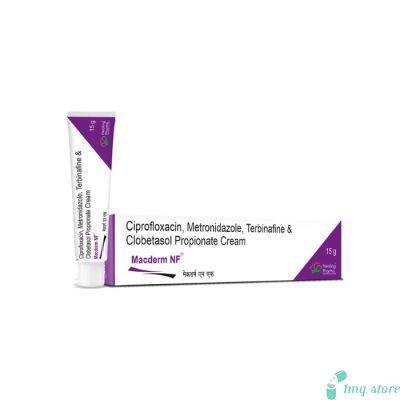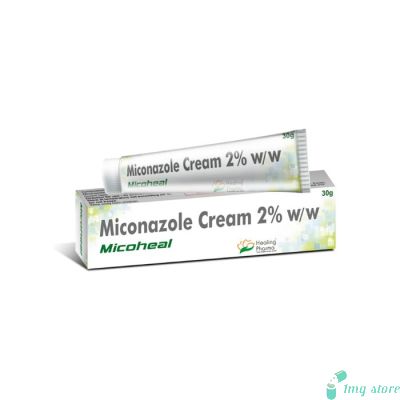Micogel Cream (Miconazole)
Miconazole cream is a widely used antifungal medication that belongs to the imidazole class of drugs. It is commonly prescribed for the treatment of various fungal infections, particularly those affecting the skin and mucous membranes. It is also sold under the brand name Monistat.
Miconazole Cream: Antifungal Medication
Miconazole cream is a widely used antifungal medication that belongs to the imidazole class of drugs. It is commonly prescribed for the treatment of various Fungal infections, particularly those affecting the skin and mucous membranes. Miconazole is an effective and safe option for combating fungal infections and is available under various brand names, which are Monistat and Micogel. This cream is widely trusted by healthcare professionals and patients alike for its efficacy in treating conditions like athlete's foot, jock itch, ringworm, vaginal yeast infections, and various other fungal skin infections. Antifungal medications are pharmaceutical agents used to treat fungal infections in various parts of the body.
Monistat, as a brand of Miconazole cream, specifically targets vaginal yeast infections caused by Candida species. The cream's localized application directly treats the affected area, ensuring effective concentration and reducing systemic side effects. It provides relief from itching, burning, and other uncomfortable symptoms associated with vaginal yeast infections. The ease of use and reliable results have made Monistat a popular choice among women seeking relief from this common condition.
Dosage Information:
The dosage of Miconazole cream may vary depending on the specific condition being treated and the strength of the product. For external fungal infections, a thin layer of the cream is typically applied to the affected area two to three times daily. It is essential to follow the directions provided by the healthcare provider or the instructions on the product label carefully. For vaginal yeast infections, Monistat, a well-known brand of Miconazole cream, offers convenient and easy-to-use applicators for intravaginal administration. Different Monistat formulations may have different dosage regimens, so it is vital to choose the appropriate product and adhere to the prescribed treatment duration.
Mechanism of Action:
Miconazole exerts its antifungal effects by targeting the synthesis of ergosterol, an essential component of fungal cell membranes. Ergosterol is responsible for maintaining the integrity and fluidity of the fungal cell membrane, and its disruption leads to cell death. Miconazole inhibits the enzyme 14-alpha-demethylase, which is a key enzyme in the biosynthesis of ergosterol. By inhibiting this enzyme, Miconazole interferes with the conversion of lanosterol to ergosterol, resulting in the accumulation of toxic intermediates and ultimately weakening the fungal cell membrane. This weakened membrane becomes more permeable, causing leakage of cellular contents and leading to the death of the fungus.
Improve Your Skin's Health with:
Taking care of your skin is essential for maintaining overall health and appearance. By adopting a proper skincare routine, including cleansing, moisturizing, and protecting from sun damage, you can improve your skin's health. Additionally, a balanced diet, staying hydrated, and managing stress can contribute to healthier skin. Regular exercise can also enhance blood circulation, promoting a radiant complexion and a youthful appearance. Prioritize skincare to achieve glowing, nourished skin and boost your self-confidence.
Some of the precautionary measures to be taken while using Miconazole cream
- Before using Miconazole cream, it is essential to consider certain precautions to ensure safe and effective treatment. First and foremost, individuals with known hypersensitivity to Miconazole or other antifungal medications should avoid its use, as it may lead to allergic reactions. If any allergic reactions, such as rash, itching, swelling, or severe dizziness, occur after using Miconazole cream, immediate medical attention should be sought.
- Furthermore, Miconazole cream is for external use only, and it should not be applied to the eyes, mouth, or vagina. If accidental contact occurs, it is crucial to rinse thoroughly with water. When using Monistat formulations designed for vaginal yeast infections, the cream should not be used during menstruation. Pregnant and breastfeeding women should consult their healthcare providers before using Miconazole cream, as safety during pregnancy and lactation has not been fully established.
- It is also advisable to avoid using occlusive dressings or tight-fitting clothes over the treated area, as it may increase the risk of adverse reactions. If the condition does not improve or worsens after several days of treatment, a healthcare professional should be consulted for further evaluation.
Miconazole cream, particularly under the brand name Monistat, has a range of uses for treating various fungal infections:
- Vaginal Yeast Infections: Monistat offers intravaginal formulations containing Miconazole for the treatment of vaginal yeast infections caused by Candida species. These formulations are available in different strengths and treatment durations to cater to varying infection severities.
- Athlete's Foot: Miconazole cream can be used to treat athlete's foot (tinea pedis), a common fungal infection that affects the skin between the toes and the soles of the feet. It relieves itching, redness, and scaling associated with this condition.
- Jock Itch: Jock itch (tinea cruris) is a fungal infection that commonly occurs in the groin area, inner thighs, and buttocks. Miconazole cream can effectively alleviate the symptoms of jock itch, including itching, redness, and discomfort.
- Ringworm: Ringworm (tinea corporis) is a contagious fungal infection that appears as circular, red, and scaly patches on the skin. Miconazole cream can help in clearing the infection and promoting skin healing.
Crucial Side Effects to Be Observed When Using Miconazole Cream
- While Miconazole cream is generally well-tolerated, some individuals may experience side effects. Common side effects of Miconazole cream include mild burning, stinging, or irritation at the application site. These effects are usually temporary and should subside as the treatment continues.
- In some cases, individuals may experience an allergic reaction to Miconazole cream. Symptoms of an allergic reaction may include severe itching, rash, swelling, dizziness, and difficulty breathing. If any of these symptoms occur after using Miconazole cream, medical attention should be sought immediately.
- Rarely, Miconazole cream may cause more severe side effects, such as severe skin irritation, blistering, or peeling. If any of these side effects occur, the use of the cream should be discontinued, and a healthcare professional should be consulted for further evaluation.
- Although systemic absorption of Miconazole through the skin is minimal, there is a possibility of interactions with other medications or adverse effects in certain individuals. It is essential to be vigilant for any unexpected reactions and report them to a healthcare professional promptly.
Answers to Common Inquiries About Miconazole 2% Cream
FAQ 1: Can I use Miconazole cream for diaper rash in infants?
Answer: Miconazole cream is not recommended for diaper rash in infants. Diaper rash is typically caused by irritation and moisture, not by a fungal infection. Using antifungal creams like Miconazole on non-fungal rashes may cause unnecessary side effects. For diaper rash, it is best to use gentle barrier creams with zinc oxide or petrolatum to protect the skin and promote healing. If the rash persists or worsens, consult a pediatrician for appropriate management.
FAQ 2: Can I use Miconazole cream on open wounds or cuts?
Answer: No, Miconazole cream should not be applied to open wounds or cuts. The cream is intended for use on intact skin affected by fungal infections. Applying Miconazole to open wounds may lead to irritation and delay the natural healing process. If you have an open wound or cut, keep it clean, dry, and covered with an appropriate dressing. If you suspect a fungal infection in or around the wound, consult a healthcare professional for proper evaluation and treatment.
FAQ 3: Can I use Monistat if I am pregnant or breastfeeding?
Answer: Before using Monistat or any Miconazole cream during pregnancy or breastfeeding, it is crucial to consult a healthcare professional. While topical Miconazole is generally considered safe, it is essential to weigh the benefits against potential risks for the individual and the baby. A healthcare provider can provide personalized guidance and recommend appropriate treatment options for vaginal yeast infections or other fungal conditions during pregnancy or lactation.
FAQ 4: Can Miconazole cream be used to treat fungal nail infections?
Answer: Miconazole cream is not the ideal treatment for fungal nail infections (onychomycosis). This condition typically requires a different approach, such as oral antifungal medications or topical solutions specifically designed for nails. Fungal nail infections can be stubborn and difficult to treat, so it is essential to consult a healthcare professional, preferably a dermatologist, for an accurate diagnosis and appropriate treatment plan.
FAQ 5: Is Miconazole cream effective against all types of fungal infections?
Answer: Miconazole cream is effective against various types of superficial fungal infections, such as athlete's foot, jock itch, and ringworm, caused by dermatophyte fungi. Additionally, it is commonly used to treat vaginal yeast infections. However, Miconazole may not be effective against deeper or systemic fungal infections. For more severe or systemic fungal infections, other antifungal medications, such as oral drugs or intravenous formulations, may be required. If you suspect a fungal infection, seek medical advice to determine the most suitable treatment approach.
Significant Drug Interactions that Require Attention For Miconazole Cream
- Drug interactions can occur when Miconazole cream is used simultaneously with other medications, including prescription drugs, over-the-counter products, and herbal supplements. Patients should inform their healthcare providers about all the medications and supplements they are taking to avoid potential interactions.
- One notable drug interaction to be aware of is with the anticoagulant warfarin. Miconazole may inhibit the metabolism of warfarin, leading to an increased risk of bleeding. Therefore, individuals taking warfarin should be closely monitored for changes in their blood clotting parameters if they are prescribed Miconazole cream.
- Additionally, Miconazole may interact with certain topical medications, potentially altering their absorption or efficacy. Therefore, it is essential to consult a healthcare professional before using Miconazole cream alongside other topical products.
| Manufacturer | : | Cipla Pharma, India |
| Equivalent Brand | : | Monistat Cream |
| Generic Search | : | Miconazole |








